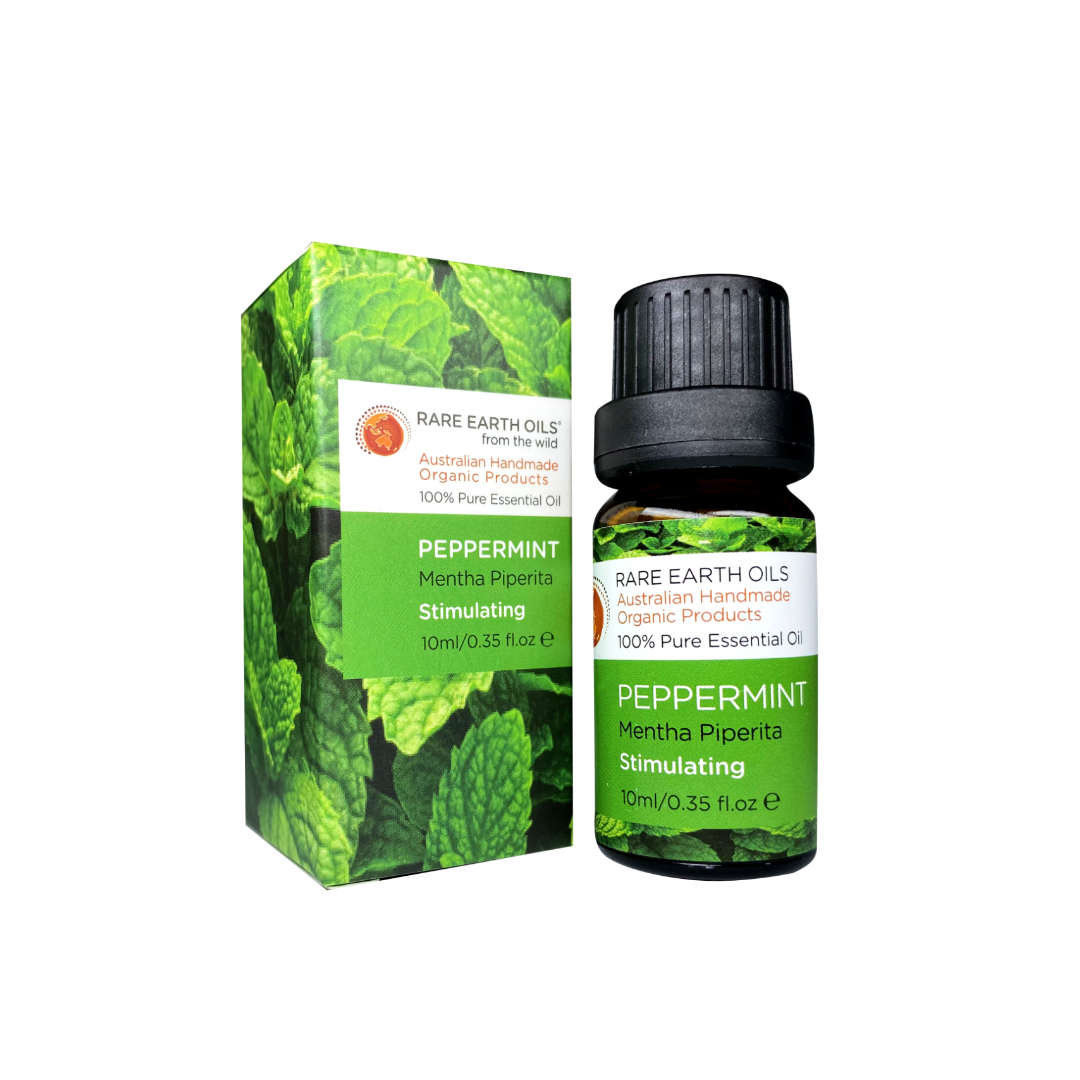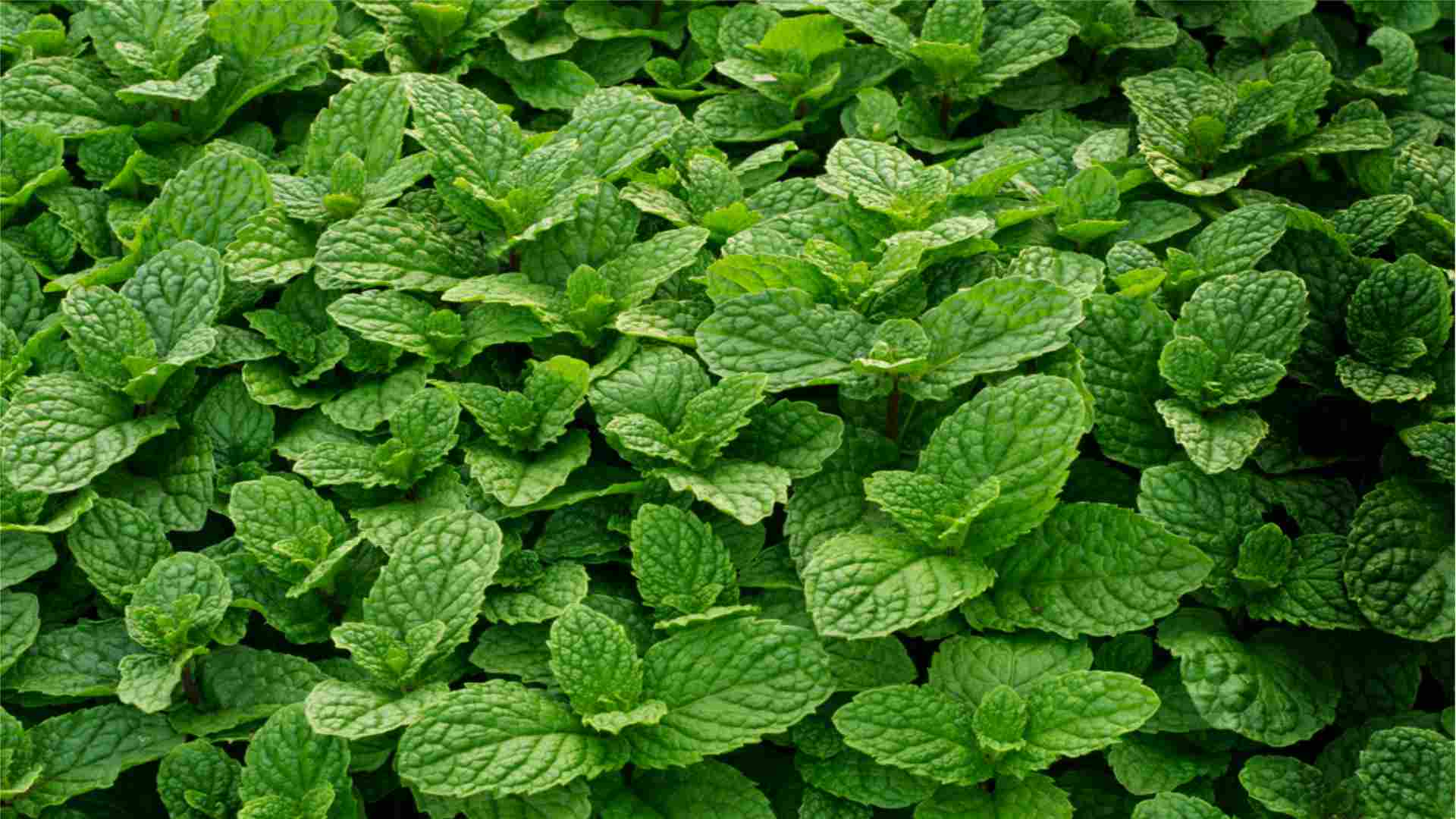

Peppermint
Need a pick-me-up? Peppermint oil is your go-to natural stimulant. Fostering alertness and sharpening focus, its the perfect work/study companion, alleviating mental fatigue and enhancing concentration. As a soothing presence, it relieves headaches and reduces stress.
Botanical Name: Mentha piperita
Aroma: Fresh and minty, with clean, crisp high notes and a deep balsamic undertone.
Note: Top
Status: Organic
Chakra: Throat
Method of extraction: Steam distilled

Aromatherapy
Peppermint opens pathways to creativity, rendering us more receptive to fresh ideas and imbuing us with inspiration. It amplifies our communicative abilities, cultivating confidence, leadership, and self-expression.
In aromatherapy it is used to stimulate and promote alertness. Helping to clear the head, it aids work or study by improving concentration and reducing mental fatigue. Calming the nerves, it assists stress release and eases headaches.
It nourishes our spirit and mind, helping us overcome inferiority or too much pride, creating balance. Used in a diffuser, the aroma creates a sense of fresh cleanliness.
Traditional Uses
Peppermint oil was often included in treatments for sinus infection, congestion, coughs, colds and the flu, especially when there are headaches and fever present.
In studies it was confirmed that diluted peppermint oil significantly reduces the pain of headaches and was considered by Asian, Ayuvedic and European herbalists to be a superior oil to ‘liberate’ the lymphatic system and improve circulation.
Because of the menthol content in peppermint oil it was considered significantly similar to a mild anesthetic for the skin and was used in muscle rubs and liniments for pain relief from joint pain, bruises, contusions, arthritis, muscle pain and spasms, myalgia and neuralgia.
In clinical studies it has been shown to have significant antibacterial and antifungal properties. And other studies showed Peppermint oil had a strong positive effect on the liver and gall bladder, and has long been considered a good remedy for digestive problems. It has also been found to have a strong effect on preventing spasms in the gut - such as colonic spasms.
Peppermint was used on the skin to relive the symptoms of; burns, sunburn, insect bites, skin irritations and itching. Peppermint oil should only be used on the skin at a dilution rate of 1% or less.
Native to Southern Europe, Peppermint oil is now cultivated all over the world. All the mints have been used historically as medicine since Roman and Greek times. When steam distillation of oils reached England in the 16th century peppermint essential oil began use in traditional herbal practice. It is used widely today in toothpaste, chewing gum, mouthwash, perfumes and soaps.
Suggested Uses
Inhalation: Aroma Diffuser for concentration and alertness
Add at 1% to massage oil for pain and headaches
Apply diluted to the neck and shoulders to keep energy levels up during the day
Add to skin balms at 1% for skin irritations, insect bites
Safety
Peppermint oil is non-toxic, non-irritating, but in some cases may be sensitising.
There are some recommendations that it should not be used on the face, especially around the nose of young children.
It is recommended to never use peppermint oil undiluted on the skin. Peppermint oil should only be used on the skin at a dilution rate of 1% or less.
Check for individual allergies.
Blends with
Sweet Orange, Lemon, Pink Grapefruit, Lemongrass, Lemon-scented Gum, Fir Needle, Cedar Wood, Rosemary, Eucalyptus and Clary Sage.
Peppermint opens pathways to creativity, rendering us more receptive to fresh ideas and imbuing us with inspiration. It amplifies our communicative abilities, cultivating confidence, leadership, and self-expression.
In aromatherapy it is used to stimulate and promote alertness. Helping to clear the head, it aids work or study by improving concentration and reducing mental fatigue. Calming the nerves, it assists stress release and eases headaches.
It nourishes our spirit and mind, helping us overcome inferiority or too much pride, creating balance. Used in a diffuser, the aroma creates a sense of fresh cleanliness.
Peppermint oil was often included in treatments for sinus infection, congestion, coughs, colds and the flu, especially when there are headaches and fever present.
In studies it was confirmed that diluted peppermint oil significantly reduces the pain of headaches and was considered by Asian, Ayuvedic and European herbalists to be a superior oil to ‘liberate’ the lymphatic system and improve circulation.
Because of the menthol content in peppermint oil it was considered significantly similar to a mild anesthetic for the skin and was used in muscle rubs and liniments for pain relief from joint pain, bruises, contusions, arthritis, muscle pain and spasms, myalgia and neuralgia.
In clinical studies it has been shown to have significant antibacterial and antifungal properties. And other studies showed Peppermint oil had a strong positive effect on the liver and gall bladder, and has long been considered a good remedy for digestive problems. It has also been found to have a strong effect on preventing spasms in the gut - such as colonic spasms.
Peppermint was used on the skin to relive the symptoms of; burns, sunburn, insect bites, skin irritations and itching. Peppermint oil should only be used on the skin at a dilution rate of 1% or less.
Native to Southern Europe, Peppermint oil is now cultivated all over the world. All the mints have been used historically as medicine since Roman and Greek times. When steam distillation of oils reached England in the 16th century peppermint essential oil began use in traditional herbal practice. It is used widely today in toothpaste, chewing gum, mouthwash, perfumes and soaps.
Suggested Uses
Inhalation: Aroma Diffuser for concentration and alertness
Add at 1% to massage oil for pain and headaches
Apply diluted to the neck and shoulders to keep energy levels up during the day
Add to skin balms at 1% for skin irritations, insect bites
Peppermint oil is non-toxic, non-irritating, but in some cases may be sensitising.
There are some recommendations that it should not be used on the face, especially around the nose of young children.
It is recommended to never use peppermint oil undiluted on the skin. Peppermint oil should only be used on the skin at a dilution rate of 1% or less.
Check for individual allergies.
Sweet Orange, Lemon, Pink Grapefruit, Lemongrass, Lemon-scented Gum, Fir Needle, Cedar Wood, Rosemary, Eucalyptus and Clary Sage.





